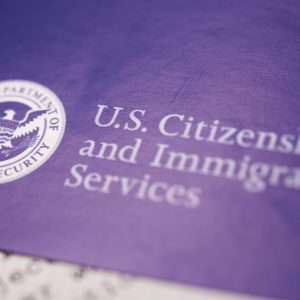U.S. Citizenship
There are a few different means by which U.S. citizenship is obtained. A person born in the United States is a United States citizen (U.S. Born Citizenship). Persons not born in the United States may still achieve citizenship if certain criteria are met (Acquired Citizenship). A person may be eligible for derivative citizenship through a family member (Derived Citizenship). A person may become a naturalized citizen if they have been a lawful permanent resident for a required time period (Naturalization).
U.S. citizenship holds a multitude of benefits. Citizens are eligible to vote and to work in certain government jobs not open to non-citizen. Citizens may remain out of the U.S. without worrying about abandonment of permanent residency. Citizens also enjoy greater benefits in international travel and are protected from deportation. Most importantly, U.S. citizenship gives certain advantages in petitioning for relatives.
We have extensive experience handling a wide variety of citizenship cases.
Naturalization
Naturalization is the process by which an eligible immigrant affirmatively applies for U.S. citizenship. An individual becomes a U.S. citizen after they have passed an interview and background checks, and they take the Oath of Allegiance administered by either a federal judge or other qualifying government official. The general requirements for naturalization are:
- Be 18 or older at the time of filing
- Have lived within the state, or USCIS district with jurisdiction over the applicant’s place of residence, for at least 3 months prior to the date of filing the application.
- Five (5) years of permanent resident status (three (3) years if married to a U.S. citizen)
- Continuous residence in U.S. for five (5) years
- Physical presence in U.S. for two and a half (2 1/2) years
- Demonstrate good moral character for at least the past five (5) years
- Demonstrate ability to speak, read, and write basic English
- Pass test of U.S. history and civics
- Demonstrate attachment to the U.S. and Constitution
Waiver of English and History/Civics Requirements
There are some waivers and exemptions to the general requirement to demonstrate English skills and knowledge of history/civics.
First, there are exemptions based on age and length of residence. If you fall into any of these categories, you are exempt from the English language requirement and may have an interpreter with you for the interview and history/civics test. USCIS will not provide the interpreter for you, however.
- Age 55 with 15 years of permanent resident status
- Age 50 with 20 years of permanent resident status
- Age 65 with 20 years of permanent resident status (this category benefits from a modified version of the history/civics test)
Second, there is a waiver available to individuals who are unable to learn English and/or the history/civics questions due to medical reasons. Common reasons may be dementia, Alzheimer’s, or severe depression. For this waiver, a qualifying medical professional must complete a form that details the individual’s medical issues and why they are unable to learn or retain English and new information. Our office has successfully represented several elderly clients and helped them obtain medical waivers, which led to their U.S. citizenship.
Naturalization application can be a complicated process. It is essential to speak with an experienced immigration attorney before naturalizing if any of these potential issues may be present:
- A criminal record
- Marriage fraud
- Mistakes in obtaining adjustment process
- Tax fraud
- Good moral character problems
- Any number of other issues that may make the application more complex
Acquired or Derivative U.S. Citizenship
Some individuals do not need to apply for naturalization to become U.S. citizens. In fact, some individuals may be U.S. citizens and not know it! Citizenship can be acquired by birth abroad if certain requirements are met. Citizenship can also be obtained (i.e. derived) by a minor, for example, through the naturalization of a parent. Individuals who are automatically citizens through the operation of law should apply to USCIS for a Certificate of Citizenship. Such individuals may also apply directly to the Department of State (DOS) for a U.S. passport, but we always recommend that you obtain a Certificate of Citizenship as well, as USCIS will otherwise have no record that you are a citizen.
A common way in which many young new citizens acquire their status is under the Child Citizenship Act of 2000 (CCA). Under the CCA, any child under 18 automatically acquires U.S. citizenship if the following requirements are met:
- At least one parent is U.S. citizen by birth or naturalization
- Child is residing in the legal and physical custody of the citizen parent
- Child is lawfully admitted for permanent residence
The laws governing the requirements for acquired/derived citizenship are complicated and often depend on many different factors, including marital status of parents, physical presence in the U.S., laws of legitimation, etc. Therefore, it is important to consult with an experienced attorney to determine whether the circumstances of your birth or parent’s naturalization qualify you for status as a U.S. citizen.
In these cases, our office thoroughly investigates your family’s history and if you have a viable claim to U.S. citizenship, we prepare Form N-600 and all supporting documentation for filing with USCIS.






